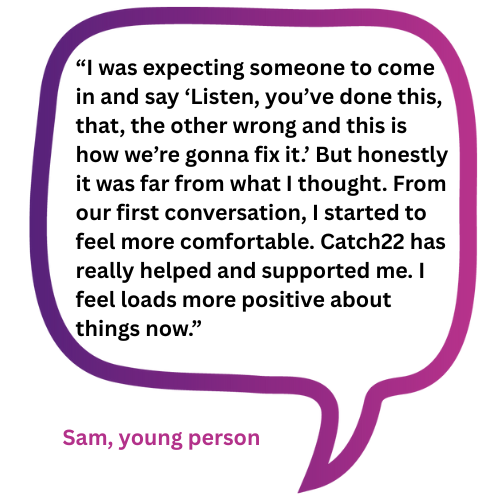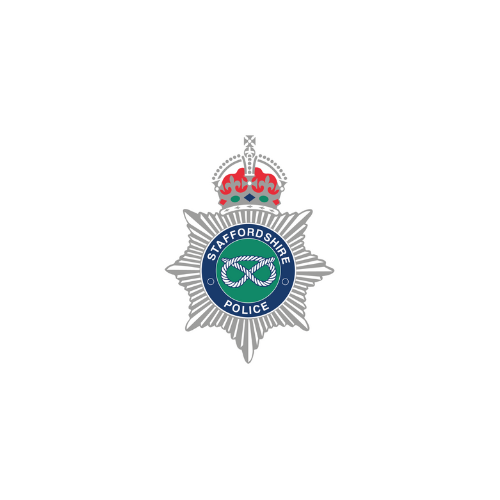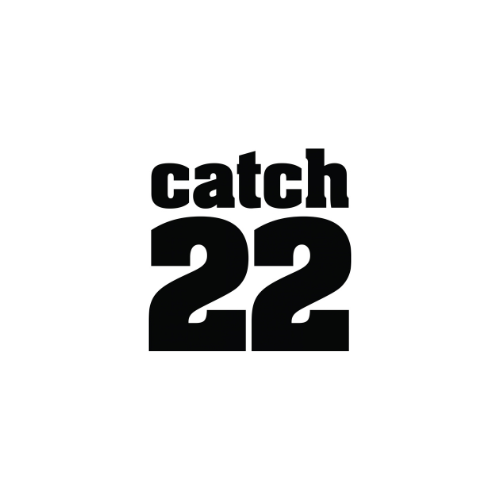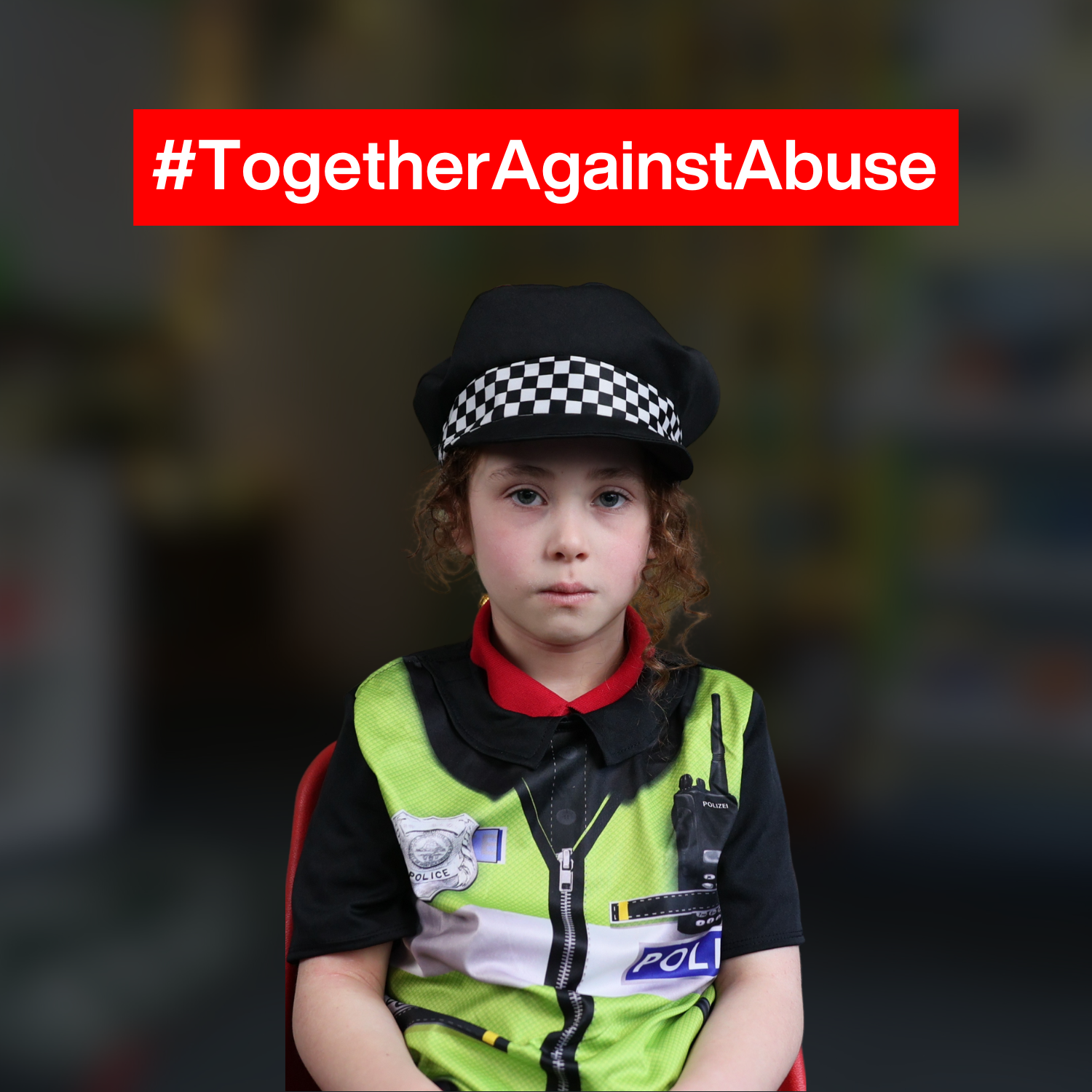“I wanted to be a gangster.” These are the words of *Anthony, a former young offender and victim of child criminal exploitation (CCE) here in Staffordshire. He agreed to speak …
Child Criminal Exploitation Service
Service to support children and young people affected by criminal exploitation
Child Criminal Exploitation Service
Catch22 deliver bespoke interventions with children and young people who are at risk of Child Criminal Exploitation, supporting them to recover and stay safe.
Commissioned by the Staffordshire Police, Fire & Rescue and Crime Commissioner’s Office, Catch22 work with children and young people who are at risk of Child Criminal Exploitation (CCE). Catch22 deliver bespoke support and interventions, empowering them to build resilience and aspiration, take control of their lives, and stay safe.
The service also works with parents and siblings of young people who are at risk of CCE, and conduct awareness building workshops with professionals where required.
Direct Support
An experienced Catch22 case worker works with the child or young person on a one-to-one basis, helping them to find solutions and build awareness around issues related to CCE, gangs and/or County Lines. Families are also included in this type of intervention, where appropriate, with support extending to parents and/or siblings.
Bespoke Support
Where a child or young person is at risk of CCE, they may already have several professionals involved in their life. If this is the case, the Catch22 bespoke support offer involved upskilling another professional with whom the child or young person has an existing and meaningful relationship. The Catch22 case worker walks alongside the professionals whilst they deliver the intervention to the child or young person.

Parent, children and professionals training/workshops
Targeted workshops are delivered in school or professional settings through group work and training sessions. Catch22 work closely with the Pan-Staffordshire Personal, Social, Health and Economic (PSHE) Education Service to ensure collaboration on a wider landscape related to CCE prevention education (PSHE) and the interventions delivered in local education establishments.
Navigator and Tailored Support Service
On behalf of the Violence Reduction Alliance (VRA), Catch22 also deliver a Navigator and Tailored Support Service. This service identifies children and young people at the most ‘reachable moment’ following arrest on suspicion of a crime or as victim of a violence offence. Find out more here.
Visit the Catch22 Stoke-on-Trent and Staffordshire webpage to find out more.
Advice for parents and carers
What is ‘County Lines’?
County Lines is a form of criminal exploitation where urban gangs persuade, coerce or force children, young people and vulnerable adults to store drugs and money and/or transport then to suburban areas, market torn and coastal towns (Home Office, 2018).
Organised criminal groups (OCGs) use phone lines to move and supply drugs, they exploit vulnerable people, including children and those with mental health or addiction issues, by recruiting them to distribute their drugs.
County Lines can happen in any part of the UK and is a form of child abuse. Other forms of criminal exploitation include child sexual exploitation, trafficking, gang and knife crime. Find out about work the VRA is supporting to help prevent and reduce child exploitation here.
Phrases that young people may use to refer to county lines include:
- ‘running a line’
- going OT/out there’
- ‘going cunch’
- ‘going country’
These all refer to going out of town to deliver drugs, money or other illegal packages such as, weapons.
Signs a child may be being exploited
- Skipping school
- Staying out late or overnight
- Unexplained gifts or new possessions
- Using drugs and drinking alcohol
- Friendships or relationships with older adults
- Inappropriate or sexualised behaviour
- Being secretive
- Changes in appearance (clothes, hygiene, etc.)
- Significant changes in mood or behaviour
- Youth offending behaviour, getting into trouble with the police, or involvement in youth justice system
- Becoming withdrawn or isolated
- Poor mental health e.g. self-harm
- Excessive time spent on social media talking to ‘friends’ they haven’t met
- Recurrent STIs
Where can I go for support?
If you are worried about a child and wish to make a referral, please visit the below safeguarding website relevant to your local authority:
If you believe somebody is in immediate danger always dial 999.
Alternatively, if you wish to give information anonymously visit the CrimeStoppers website below.
Other useful resources
- Are you listening Child Criminal Exploitation awareness video: Are you listening? (youtube.com)
- The Children’s Society Slang Dictionary: Slang-Dictionary-A5-Booklet.pdf (ivisontrust.org.uk)
- BBC documentary ‘Hidden Girls’: BBC Three – Hidden Girls
- Parents guide to Online Safety: Online-safety-parents-guide.pdf (westmidlands-vrp.org)
- Parents guide to Child Sexual Exploitation: Sexual-exploitation-parents-guide.pdf (westmidlands-vrp.org)
Advice for young people
What is a gang?
The word ‘gang’ can have different meanings depending on what context it is used. In the Government’s paper ‘Safeguarding for children and young people who may be affected by gang activity’ they distinguish between peer groups, street gangs and organised crime groups (OCGs).
- Peer group – A relatively small social group which may or may not describe themselves as a ‘gang’ depending on the context.
- Street gang – Groups of young people who see themselves (and are seen by others) as an established group who are known to commit criminal acts and acts of violence.
- Organised criminal gangs or ‘OCGs’ – A group of individuals involved in crime for personal gain (i.e. financial). These individuals will see crime as their ‘occupation’.
What is grooming?
Organised crime groups groom children, young people and vulnerable adults by building a relationship, trust and an emotional connection with them. Once they have built this relationship with them they will manipulate, exploit and abuse them.
Anybody can be a groomer. It doesn’t matter what age, gender, or race they are. Grooming can happen over a short or long period of time and can either be online or in person. Groomers may even build a relationship with family members to make them seem trustworthy or authoritative.
Groomers can form different types of relationships with a vulnerable person. This could be:
- Romantic relationship
- Mentor
- Authoritative figure
- Dominant and persistent figure
Whether online or in person, groomers often use tactics such as:
- Buying gifts
- Giving attention, advice or showing understanding
- Pretending to be younger
- Taking them on trips, outings or holidays
I’m being pressured to carry packages for a gang. What can I do?
- You should never let anybody pressure you into doing something you don’t want to
- If you think you may be pressured into carrying something illegal, try to think of a way to say no before you are put on the spot
- Try to stay away from situations that you know are likely to result in somebody asking you to do something you don’t want to do
- Find positive things to do which will help you avoid dangerous situation
Help and Support
If you are worried about yourself a friend, being pressured into carrying an illegal package or are in a situation that you feel uncomfortable, you can get advice from independent agencies. When you contact them you do not have to give your personal details or information.
Staffordshire Youth Offending Prevention Service
If you believe you, or somebody else, is in immediate danger always dial 999.
Help and Support available to you
Visit our Support page for further information and advice on where to go for support.
Campaigns
We are taking a partnership and inclusion approach to bringing about positive changes in communities throughout Staffordshire & Stoke-on-Trent. These projects are created or selected based on understanding and needs of local communities, brought by those who are living and working within them.
Latest News
From today, (Friday 1 August), ninja swords across England and Wales have been banned and the law around ownership change. Under the Criminal Justice Act 1988 (Offensive Weapons) (Amendment, Surrender …
Over 200 children at risk of, or victims of, Child Criminal Exploitation were supported last year by the Catch22 service, commissioned by the Staffordshire Commissioner’s Office. A further 169 parents …
The Staffordshire and Stoke-on-Trent Violence Reduction Alliance (VRA) has launched a new campaign to tackle violence against frontline workers across the City and County. Developed in partnership with Staffordshire Police, …


